iPhone Fold rumors and renders: What to expect after years of leaks and speculation
Apple is working on a foldable iPhone that for the last six years, is always rumored to be a year away. Here's what you need to know about the iPhone Fold, what it may look like, and how much it may cost.
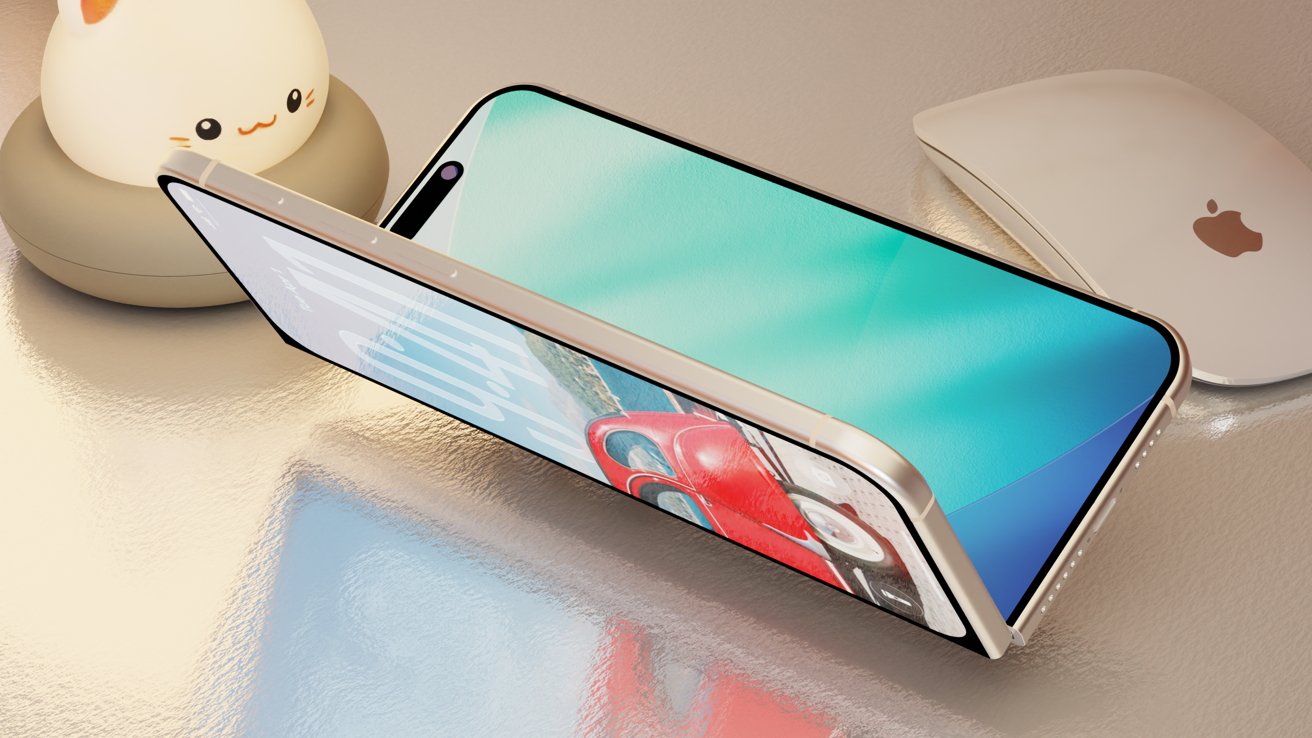
What the iPhone Fold could look like - Image Credit: AppleInsider
Rumors about the iPhone Fold have circulated for over half a decade. An iPhone with a foldable display is a naturally attractive target for wild speculation, and it has fueled the rumor mill for years.
While there have been the occasional Apple patent application confirming elements of the supposed smartphone have been considered by the company, the rumor mill has picked up the slack when it comes to discussing the hardware.
It's reached a point where the main design concepts of the model have been decided upon by rumor merchants and analysts.
With rivals such as Samsung already occupying the folding smartphone market, there is pressure for Apple to actually join in with its own effort. Something that may actually happen within a few years.
This is a summary of what the rumor mill believes is on the way.
iPhone Fold release timing
As a tricky-to-design and produce smartphone, you could be forgiven for believing Apple could push the release of the iPhone Fold into the future until it gets things just right. Based on the repeated supposed pushbacks in the Apple rumor space, this is a thing that could've been happening for quite a few years.
Back in November 2020, Foxconn was said to be testing foldable iPhone prototypes. The prospect at the time was it would launch by September 2022.
By September 2021, analyst Ming-Chi Kuo proposed that it would instead arrive by 2024.
When February and March 2024 arrived, Apple was then said to be planning a 2026 release, but then delayed it to 2027. By June 2024, the 2027 launch seemed more certain.
An August claim from analyst Jeff Pu insisted that a 2026 launch would happen, alongside a foldable iPhone. Pu would go on to reiterate the claims in March and April 2025.
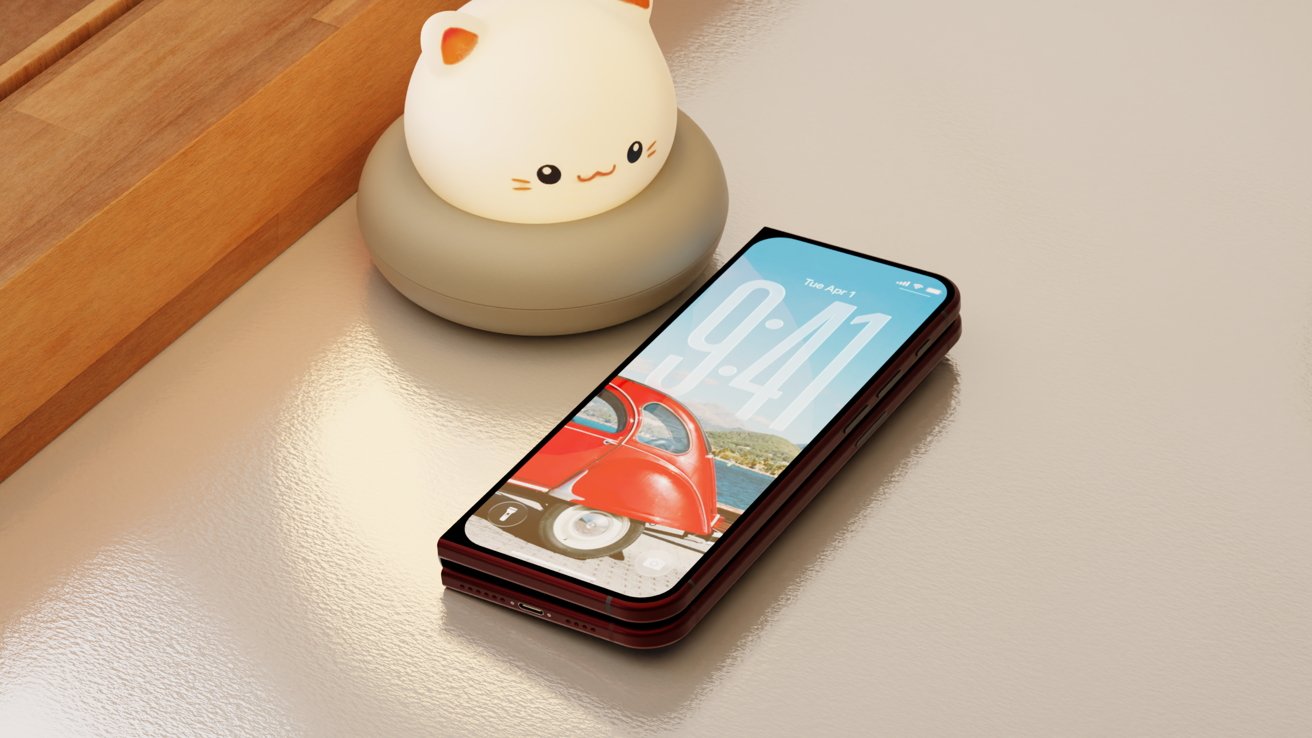
The external display of the iPhone Fold - Image Credit: AppleInsider
In February 2025, it was anticipated that manufacturing could start in early 2026, pointing to a 2027 release. However, another report from the same month insisted that a debut would happen in 2026, with production starting in late 2025.
Ming-Chi Kuo resurfaced in March 2025, backing up the claim of a late 2026 or early 2027 debut and manufacturing in Q4 2026. In the same month, Mark Gurman wrote about a forecasted 2026 launch for the iPhone Fold, which another report backed up in May 2025.
Gurman also posted in May about the 2026 or 2027 launch.
In June, Kuo said that Foxconn will kick off a project to produce Apple's first foldable smartphone in late Q3 or early Q4 2025, with mass production anticipated for summer 2026. This would feed into a late 2026 or early 2027 release.
At the start of July, DigiTimes insisted that Apple had produced a prototype iPhone Fold, fitting in with the summer 2026 mass production rumor. Later that same month, Gurman doubled down on the debut "next year," meaning 2026.
Overall, the current consensus is for a 2026 or early 2027 launch of the iPhone Fold. This all pretty tidily lines up with the typical iPhone production schedule, and seems quite plausible.
Of course, there is always the possibility of further delays, and of the rumor mill being wrong once again.
iPhone Fold display supplier
Apple has a close relationship with display suppliers in its supply chain, with it arguably the most important component overall. However, even for the iPhone Fold, there has been some debate over who will provide the screen tech.
In April 2022, rumors indicated that Apple was working with LG Display on a foldable MacBook or iPad screen, but only a month later, reports about a foldable iPhone display began to appear.
By September 2022, it was thought Apple was working with LG Display and Samsung Display, its usual suppliers, to develop displays that won't crumple. All by creating hybrid OLED panels that put together inflexible sections of glass with flexible plastic substrate panels that handled the actual bending.
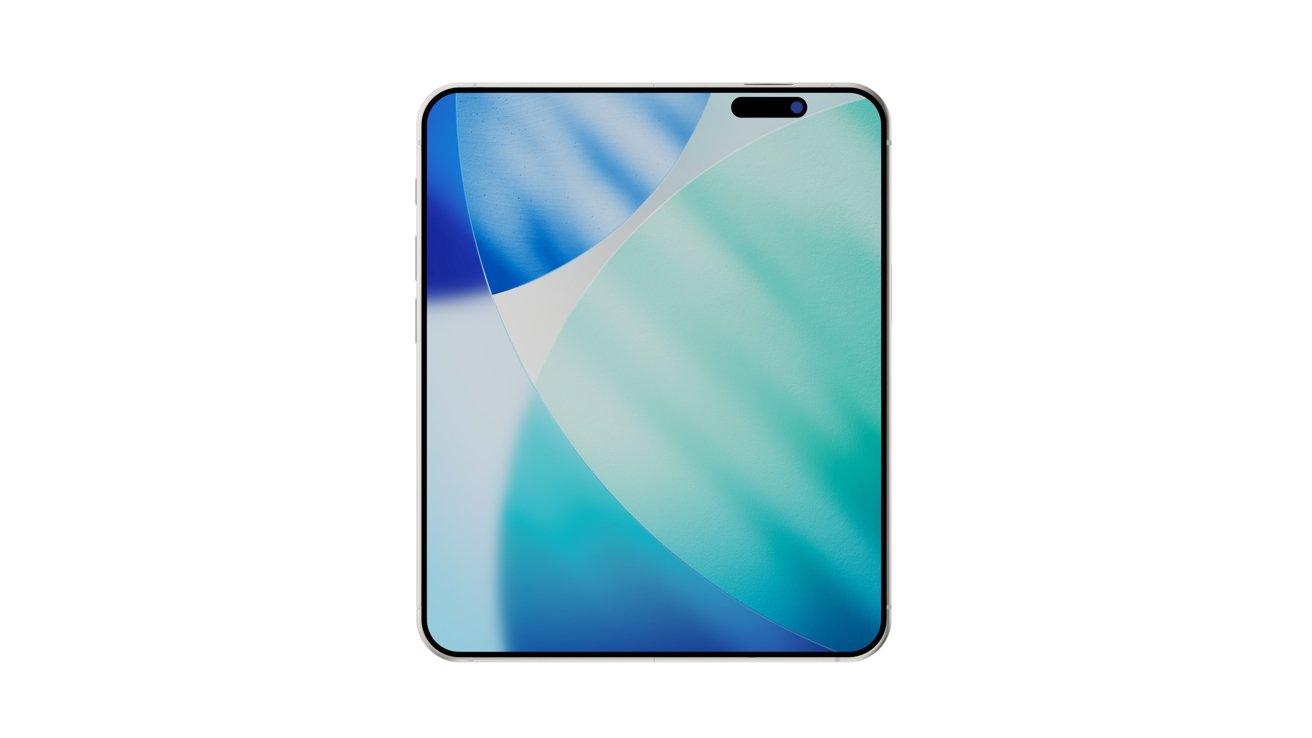
The iPhone Fold's display, unfolded - Image Credit: AppleInsider
However, Apple was apparently still deciding on the supplier by January 2025. A month later, one leaker proclaimed the iPhone Fold display would be developed exclusively by Samsung, contradicting prior LG Display rumors dating back to 2017.
It appears as though Samsung has an edge thanks to its experience with its own foldable products. Reports from April 2025 and May 2025 have both said that Apple has chosen Samsung as its display partner.
This also lines up with a December 2023 rumor claiming folding iPhone displays were the focus of a then-new Samsung business group.
In July, a report said that Samsung Display was nearing completion of a new production line, which would be used just to produce folding displays for Apple.
iPhone Fold display specifications
The iPhone Fold is expected to have two screens in total. The folding screen will be the larger of the pair, and will be inside the folded section when the iPhone Fold is folded up.
A smaller outer display will also be available for general use while the iPhone Fold is in its folded form.
In February 2025, one leaker said the display for the iPhone Fold could be "comparable to two 6.1-inch iPhones folded together, resulting in a total size of over 12 inches."
However, the math of that measurement feels a bit wrong. It would realistically be a screen size in the ballpark of 7.5 inches, not far off the 8.3-inch iPad mini.
That same month also saw a different rumor that Apple's foldable iPhone would have a 5.49-inch outer screen. The inner screen, to make it look more like an iPad, reportedly measures a more realistic 7.74 inches diagonally.
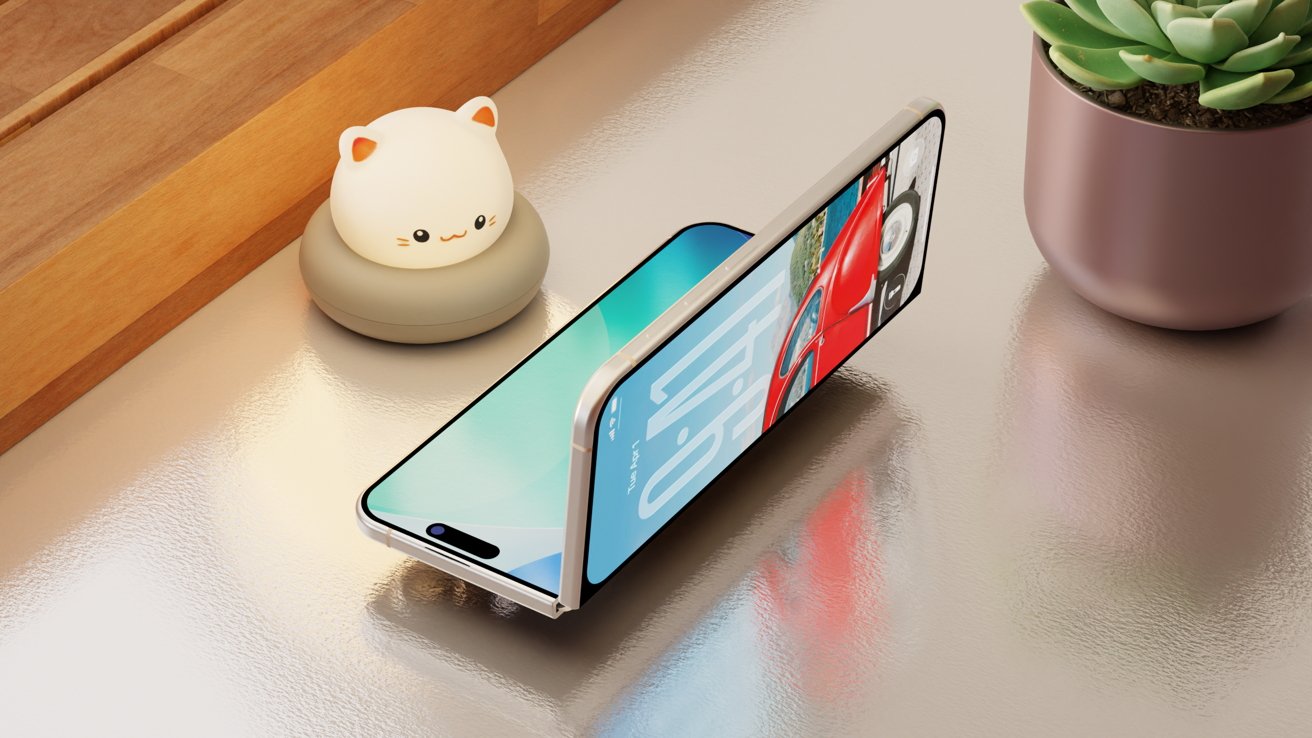
Unfolding the iPhone Fold will effectively double its width - Image Credit: AppleInsider
Analyst Ming-Chi Kuo seemingly agreed with this, by saying in March 2025 that the "folded-out inner screen" would be 7.8 inches, while the outer screen would be 5.5 inches. Two April 2025 rumors also provided similar dimensions.
Both leakers proposed that the inner display will have a resolution of 2,713 by 1,920. This would give the display a pixel density of 428 pixels per inch. A
According to the same source, the external-facing display will measure 5.49 inches and have a resolution of 2,088 by 1,422. This is a pixel density of 460ppi, matching that of Apple's typical iPhone displays.
By June 2025, a Weibo leaker said the internal screen size measures 7.58 inches, smaller than previous claims of 7.74 inches and 7.76 inches. The resolution was maintained at 2,713 by 1,920.
Analysts at Trendforce also contributed in July, with a 5.5-inch external display and a 7.8-inch internal folding display claimed. Again, this is in the same ballpark as other previous claims.
iPhone Fold display creases and hinges
The ways Apple could approach a folding iPhone can dictate how durable the device ultimately is. Namely, Apple would need the screen to withstand repeated folding over prolonged periods, with movements and flexing developing a crease over time.
Apple patents have discussed the topic, including one from October 2021 that introduced the concept of a folding iPhone that puts the display on the outside. While this minimized creasing by maximizing the radius of the screen when folded, it does have the downside of leaving the screen at the mercy of the elements.
Apple's patents reveal that the company has been considering a foldable iPhones since 2015. One such patent, from 2020, indicates that Apple may implement technology so iPhone displays themselves could "heal" the inevitable wear and tear.
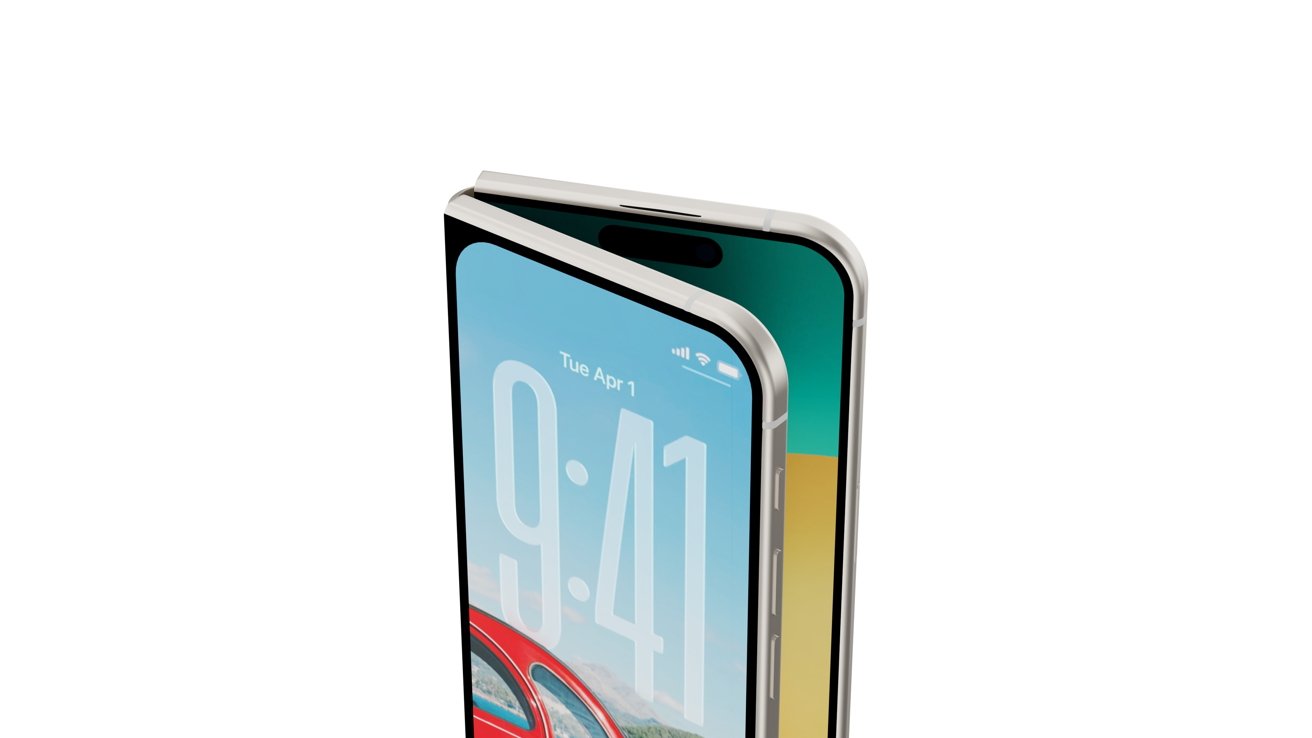
The iPhone Fold should fold up like a book - Image Credit: AppleInsider
"Electronic Devices With Flexible Display Cover Layers," proposes mixing rigid and flexible areas for a display and using what Apple calls "self-healing." This could be related to the scratch-resistant display coating rumored for the iPhone 17 range, though this was reportedly abandoned in April.
Apple has also considered internal screen fold designs too, but with remarkably complicated hinge mechanisms. The idea was to use added supports for the display at its most vulnerable point, so that users could press down on flexible sections without damaging the screen.
The iPhone maker's patents have proposed the idea of using stretchable displays as well. However, it seems unlikely for Apple to go down that route for the iPhone Fold for the moment.
In February 2025, a report said that Apple's folding iPhone may not be plagued by a crease at all. A source doubled down on claims Apple was working hard to avoid wrinkles in the display, which can emerge over time.
Ming-Chi Kuo said in March 2025 that Apple would use a liquid-metal hinge for the iPhone fold display. The same month, a different leaker explained that the material could be twice as strong as titanium.
Liquid metal technology has also appeared in Apple patents from 2014 and 2015.
In July 2025, Kuo wrote that Apple could end up using Samsung Display's design for the iPhone Fold, rather than one of Apple's own design. The decision would mean that Samsung's tech would need to be reliable enough to avoid creasing to a level Apple is happy with.
It would also avoid any further delays in mass production through the use of an established design.
iPhone Fold design and battery
When it comes to the thickness of the device, Kuo claimed in March 2025 that it would have a folded thickness of approximately 9mm to 9.5mm. When opened, its thickness would be approximately 4.5mm to 4.8mm.
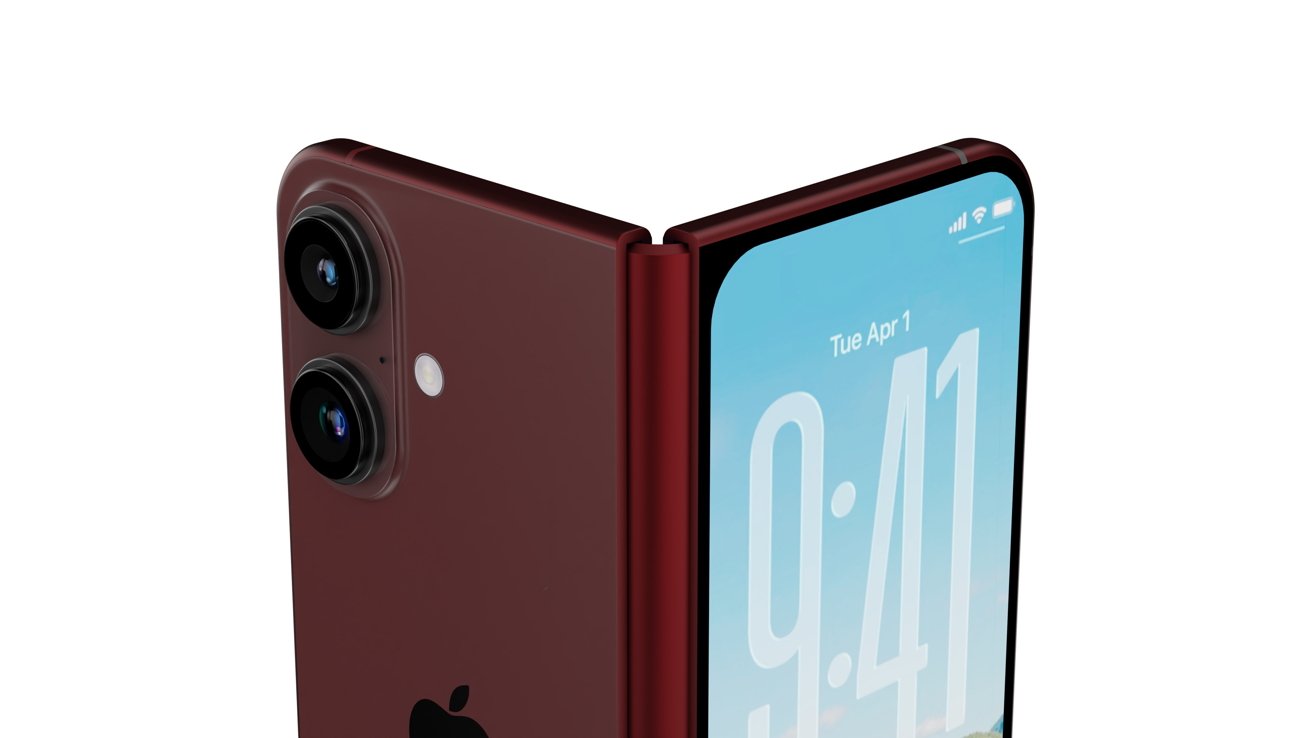
The iPhone Fold should be less than a centimeter thick when folded - Image Credit: AppleInsider
In March 2025, two separate leakers said that iPhone Fold display engineering efforts were focused on power efficiency. Supposedly, this will "achieve the goal of slimming the battery by improving the Display Driver Integrated Circuit (DDI)."
One of the leakers believed that the driver IC chips in the folding display are being upgraded, from using a 28-nanometer production process to a 16-nanometer version.
Improved battery life may be the end result of these efforts. We could also see flexible batteries in the iPhone Fold, as an Apple patent from 2020 references this technology.
One February 2025 leak added that there would be a "3D Stacked" battery cell system in use, though that leak wasn't considered reliable at the time.
iPhone Fold camera
Arguably more important than the battery is the camera system that Apple employs, and the challenge of using two displays will make that a crucial decision for the company.
To some leakers, the internal display will supposedly use a hidden under-display camera that will be similar to other foldable device screens, while the external display will rely on a visible punch hole camera.
A dubious February 2025 leak claimed this entailed the use of a new "Meta Lens" front camera, as well as rear Main and Ultra-Wide options.
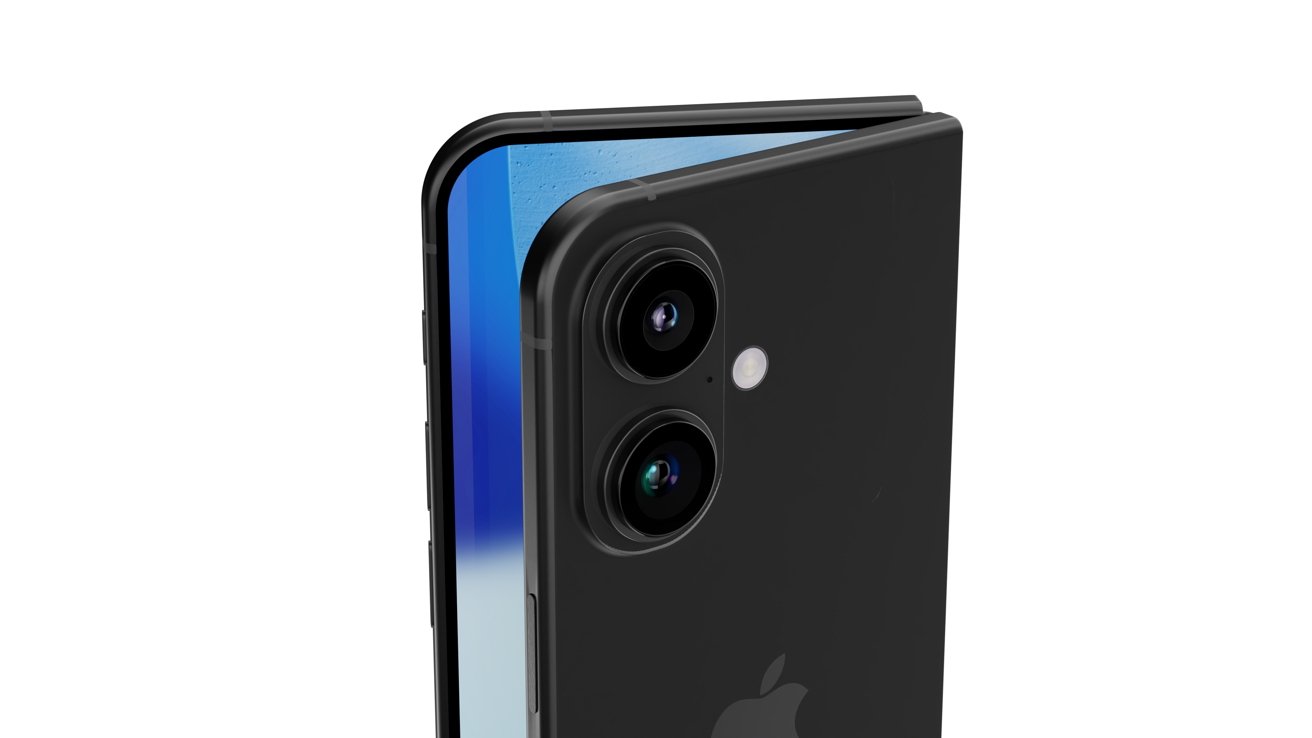
Dual rear cameras are the current hot favorite for the iPhone Fold - Image Credit: AppleInsider
In March 2025, Kuo posted that there would be dual rear camera lenses, though stopped short of providing resolutions. There would also be a front camera on the main display too, though no Face ID in favor of a Touch ID sensor.
In June 2025, Weibo leaker Digital Chat Station said Apple will use a dual camera system on the rear, including a 48MP sensor.
iPhone Fold pricing
When the iPhone Fold eventually goes on sale, it will almost certainly be an expensive mobile device. If the rumor mill is to be believed, it could end up being twice the cost of a normal iPhone.
A March 2025 report insisted that the cost could be around $2,300, more than a Mac Studio.
However, Ming-Chi Kuo has also put forward a price range estimate of $2,000 to $2,500 as well. A third April 2025 estimate puts it at between $2,100 and $2,300.
Whichever price is right, it's expected that consumers will have to shell out a lot if they want the fanciest iPhone on the block.
Read on AppleInsider

Comments
The Apple Car Is Coming… Next Year. Always Next Year.
Next year, the iPhone Fold is coming.
The year after that? It’ll be coming then, too.
And the year after that? Absolutely — next year.
It’s the same shimmering oasis on the Apple roadmap we’ve been trudging toward for a decade. Like the Apple Car. Remember the Apple Car? It’s been “almost here” longer than most people’s kids have been in school. Somewhere deep in Cupertino, I imagine a secret calendar marked with a single word under every year: “Tomorrow.”
We’ve seen no prototype, no spy shots, and no proof it can do anything a Honda Civic can’t — except maybe sync your wipers to iCloud. But trust the process. Apple is refining it. Perfecting it. Whispering to it softly in the lab.
And one day, we’ll finally see it. Next year.
Now even assuming they solve the crease problem and provide a good enough hinge (and I doubt they would ship anything with a visible crease or a bad hinge, they’re not Samsung who’s perfectly fine shipping garbage) we’re left with a phone that may have mediocre battery life, unremarkable cameras, is way too thick but most of all an unfolded screen form factor that serves no purpose. Is it good for watching movis? No! It doesn’t buy you more screen size to watch a widescreen movie than you would get by using your regular phone in landscape mode; one thing it does is get you a second screen to text while you watch — or help in general with multitasking.
I’m not seeing the value here, especially considering the astronomical price and the folded size which is way too thick.
Just because you can't see how useful it might be, that doesn't mean others won't. You're looking at it purely as a media consumption device, whereas these phones, even Samsung's own offerings, are marketed as workhorses. And as for the battery, as large as the dual screens may be, you also fail to see how it being almost iPad-mini-sized allows for not one, but two batteries. It should have relatively decent battery life, if not the best in the entire lineup.
I think it's clear that CarPlay Ultra is at least a variation of what they were researching with Project Titan -and- I think it would be foolish to think that Apple hasn't been researching and working with foldable displays since they first became manufacturable, which means insiders are likely relaying legitimate data to websites like Apple Insider — but none of that matters until there's a product officially being announced by Apple. Case in point, Apple announced the AirPower mat but then later scrapped that. They definitely jumped the gun there, and we've also seen that many times over the years with various OS features. That said, Apple is better than most in this regard.
Note that this is going to be a "short" iPhone if the hinge is along the short side of the inner display, and it has to be along the short side if the outer display is 2088 x 1422. It's going to be something like 3.2" wide by 4.7" tall when folded. So, as wide as a Pro Max, but as short as an iPhone 5 when folded up. It's going feel like a thin Blackberry of yore? In the pocket, on your ear and thumb typing.
When unfolded, it's going to be something like 6.6" wide by 4.7" tall. Smaller than the current iPad mini, which is 7.7" x 5.3". For this squarish aspect ratios, something more square than 16:9, display sizes on order 7 to 8 inches is a an input zone of death. Too wide for thumb boards and not wide enough for full key size keyboards. So, you're left with hunting and pecking with a couple of fingers, which is not good for text input. This pushes this type of form factor further into reading and watching usage, while phone stuff is left to the outer display.
The crux of the problem is whether that type of usage is worth it for +1000 USD. Not a big market. The thing it does have going for it is that profit margins should be pretty good relative to a $500 phone. Hence, making a folding phone at $2000 more viable then a $500 one to a company like Apple. Well, it depends on the units sold, but it seems there are enough sales for multiple OEMs to do it.
And yeah, I think they will use a Touch ID button on the top like in iPads and will not use Face ID for biometrics. The lack of asymmetry on the inner display is a poke in the eye. Once that Touch ID button is there, it means no Face ID on the outer display either.
The ear speaker has to be on the side with the outer display, not the way it is rendered here. The speakers themselves present some weirdness, and may relegate where the phone goes to your ear in a non-traditional way. There has to be four total to make it "work" for both outer and inner displays? But you'd give up symmetry for using the phone on right and left ears? Probably fine if there is a speaker in each corner when unfolded, and nothing near the middle of the sides.
Camera bumps look insane for this form factor. Haven't seen anything that remotely resembles anything nice. I'm an oddball here and would prefer a terrible camera that is flush, but its cost is going to demand a good camera, which means a big bump which means it can't lay flat on a table or at least lay stable on a table. Still hoping that employ like 5 small cameras that are flush in a 0.18" thick body, and computationally fuse the images into a one nice image.
Obviously your tagline wouldn't help sell the Fold (working name, lol). But even if it's only an "Apple a folding phone" folder with only Apple touches on form and function, that's not a bad thing. Not a great thing for those expecting/demanding The Next Big Thing. But if it gets the customers who want and are willing to pay the bleeding edge price, then it's better than Samsung or some other company getting their money.
As far as the crease goes, someone willing to pay those prices, could trade in their phone every couple of years for a new one. Millions of customers to that, sometimes every year. I don't, and don't and price for a Fold is just more than I feel ok about spending.
So according to you an Apple Fold will just be a "me too" phone and no one in the Apple eco system will want a Fold or be willing to pay for it? You know the numbers involved? Maybe you should explain this to Apple and save them the pain of another device that doesn't sell.
Apple has apparently seen the market for other companies' folders and thinks there is something there even if you don't. Even if the Fold were to be "me too" product it's one that those who you say are stuck in the Apple ecosystem and who want a folder, will be able to buy.
How successful Apple is will obviously depend on what Apple offers and at what price. So let them "chase" and see what they catch. It's beyond silly to write Apple off at this point.
Chinese brands have a complete suite of options that cover a very broad scope (truly smart homes, smart cars, folding phones of all kinds, folding tablets/PCs plus and endless list of wearables and home appliances etc).
In the ultra-premium folding phone segment, it is not improbable that Apple is losing some top end customers who have the disposable income to be able to buy them.
By not being able to offer a folding option Apple isn't in the game. The same can be said of the car situation and in wearables Apple has long had problems competing against what is available from Chinese brands. In battery life alone, if you only want to charge once a week, Apple is not an option.
In that sense alone, an Apple folding phone offering would help a lot.
iPhones are regularly discounted via Chinese Apple authorised retailers (and have been for a few years now).
All this without taking into account geopolitical issues which are undoubtedly spurring on sales of Chinese brands. On one side through patriotism towards China Champions and on the other through reluctance to buy American.
Samsung may also be looking to step in on that last point as its rumoured tri-fold phone will only be released in China at first.
As I recall, you've always said that Chinese OEMs offer more advanced phones, at least for the said past 6 to 8 years. When is the time for it to hurt Apple's financial performance? You obviously would be making different choices than Apple, but success for your choices isn't guaranteed either.
It is a fine line between serving a niche and a mass market for a company, and a fine line between what is advanced and what is not, or, whether the pros outweigh the cons of this or that feature. Apple chooses its niches, for sure, and says no to a lot of ideas.
I would love for Apple to make an EV, have solar+storage products, as well as shipping more computer, tablet and phone product lines, but it goes too far to say the lack of doing it is a problem. Their results speak for themselves. There biggest issues are political: they have become too successful and governments are trying to slow them down, the aforementioned geo-political issues, the current US government, so on and so forth.
the pro max is my size limit.
I still remember people here claimimg that there was no need to offer more models when I argued that was very necessary. Two were all that was needed and the financials backed that thinking up. Well, then came iPhone X and look where we are now. People argued against Apple making a folding phone but we are commenting on yet another Apple folding phone article that even includes comments on Apple surveying users on the subject. I get the feeling some of those who were adamant that it would never happen are feeling less sure of that now.
The problems began in earnest back in 2017 when Huawei released the Mate 10. That's when Trump first stepped in to literally strongarm AT&T out of a deal to carry that phone in the US market.
That was Apple's first let off. Just look at what Huawei had done in Europe.
Then in 2019 it was put onto the entity list and Huawei was basically not allowed to sell its phones in one of the world's largest markets. Apple's second let off.
It was now able to 'drip feed' users with features that were freely available on Android phones long before. Most of them on Huawei phones. Samsung was the only real contender in the US and they were coasting too.
During 2020 Huawei became the world's top handset vendor - even without access to one of the world's largest handset markets. Overtaking both Apple and Samsung.
Then US sanctions were gradually intensified, forcing Huawei to de-Americanize across its entire supply chain.
Over 14,000 components were redesigned to eradicate all US technology. Most of that favored Chinese advancement and was detrimental to US interests. At the time of the ban Huawei was pumping $11B into US companies per year. It was all lost.
Huawei developed and implemented one of the most gigantic and complex pieces of software ever undertaken and in record time (MetaERP) which was described as like having to replace a jet engine in mid-flight.
https://min.news/en/tech/c07ce345547c8a63aa54979c37b89ad5.html
It began research and investment into every single part of the chip design and manufacturing process. From EDA through chemicals, optics, lithography, packaging... The whole thing and now has a huge facility opening soon.
https://www.androidheadlines.com/2025/05/huawei-building-advanced-chip-factory.html
Rumours are pointing to a lithography breakthrough coming late this year and mass production early next year. We'll see.
It had to develop its own 'universal' operating system from scratch: HarmonyOS. That has now overtaken iOS in China and the open source version is being used as a base of new operating systems like OniroOS.
Apple has actually been announcing more and more Android/HarmonyOS features over recent years! Especially HarmonyOS in terms of foundational advances.
Huawei developed NearLink and is also involved in GPMI. Let's forget for a second that Huawei had 5G modems available back in 2019! And then put them on-SoC. Apple was still waiting on Intel back then.
Huawei moved into the automotive business leveraging its massive R&D outlay to produce all of the core components/software of modern day NEVs and has partnered with many car manufacturers to offer state-of-the-art vehicles, all running HarmonyOS. Its self driving technology best in class.
It has also been making advances in battery technology.
https://carnewschina.com/2025/06/18/huaweis-3000km-solid-state-battery-patent-with-5-minute-charge-ignites-industry-race/
Huawei expanded its cloud business and is currently one of the fastest growing cloud infrastructure providers.
In AI it shipped a huge amount of specialised AI LLMs and tiny models for industry and consumers. Jensen Huang described Huawei as a 'formidable competitor' and had to push hard to get the US government to backtrack on more sanctions against Huawei because it was damaging Nvidia to the tune of billions.
Huawei has just released its CloudMatrix Atlas A3 SuperPoD.
Huawei has also just open-sourced its Ascend full stack software suite too. Specifically targeting Nvidia
The list goes on and on but it should be clear to you by now that Apple has little to nothing to compete against all that in China and that isn't something new. It's why Apple has been discounting its phones there for a few years now.
Imagine walking into a Chinese Huawei Store and then an Apple Store and comparing what is on offer in terms of technology.
IMO, the girl in this video is a little too much for me because she's too 'blown away' and only scratched the surface on what's on offer but if you were living in China and had access to the devices you might be swayed...